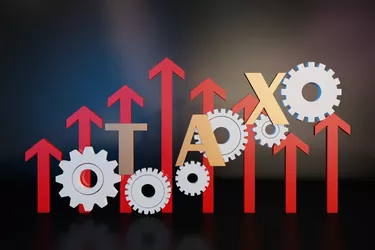
Distortionary taxes are taxes that affect the prices of items in a market. For example, a tax on beef might convince people to switch to chicken as a substitute. Income taxes are distortionary because they increase the cost of hiring an employee, but don't affect other production costs such as equipment. A nondistortionary tax affects everyone, such as a $100 capitation tax that each citizen must pay.
Intentional Distortion
Video of the Day
Some distortionary taxes are intentionally established to reduce market externalities, which are costs that a business imposes on members of the public because of its operations. Biodiesel may cost more to produce than diesel made from petroleum. To encourage citizens to use renewable resources, a government may assess a higher tax on standard diesel than it assesses on biodiesel. A tariff is also a distortionary tax because it makes imported products cost more, so consumers have an incentive to purchase domestic products.
Video of the Day
Business Structure
Distortionary taxes can affect the structure of a business. A private company has to pay payroll taxes for each employee it hires. Although a government also pays payroll taxes on its workers, it also receives tax payments, so part of the payroll tax effect cancels out. The government needs less productivity from each worker it hires because of this tax effect, so a government agency can hire more workers at a given level of production than a private company can.
Unintentional Effects
A distortionary tax can have unintended consequences. If an airline company has to pay an additional tax because of the loud noises that the airplanes make and the tax revenues go to compensate people who live near the airport, people who would normally not have purchased houses near the airport may purchase them to receive the compensation payments. The purpose of the tax is meant to be compensating current residents, not encouraging more people to live near the airport.
Inefficiency
A distortionary tax creates market inefficiencies. The tax makes products cost more than they would normally cost but don't improve the quality of the product. This distorts the supply and demand balance, creating a deadweight loss. Fewer buyers will be willing to pay the market price for the product, plus the tax. Fewer suppliers will be willing to receive the market price for the product minus the tax. Because of this situation, the price can't be set at the most efficient level, where the number of products buyers demand is equal to the number of products sellers are willing to sell.